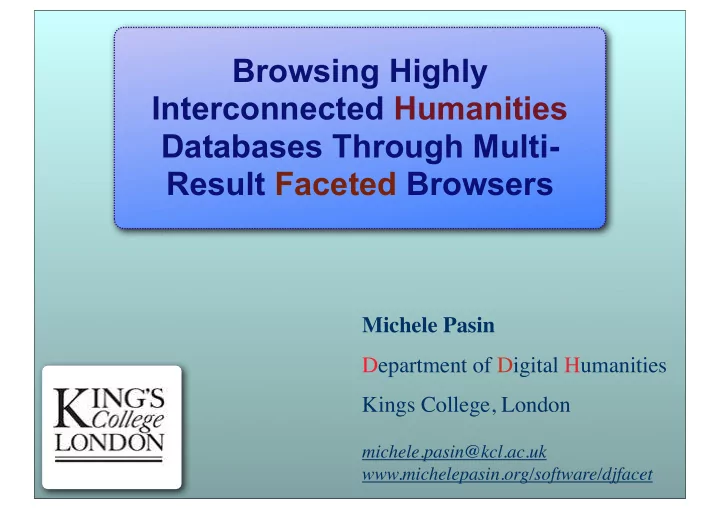

Browsing Highly Interconnected Humanities Databases Through Multi- Result Faceted Browsers Michele Pasin Department of Digital Humanities Kings College, London michele.pasin@kcl.ac.uk www.michelepasin.org/software/djfacet
Summary 1. Background . Interaction models in search interfaces: retrieval model vs explorational model 2. Approach . DJFacet, a multi-result dynamic taxonomies search system 3. Evaluation . Strengths and weaknesses; future work
Background: two models of interaction Retrieval Model Exploration model v s DYNAMIC ¡ TAXONOMIES ¡ AND ¡ FACETED ¡ SEARCH , ¡ Giovanni ¡ Maria ¡ Sacco, ¡ Sébastien ¡ Ferré ¡ and ¡ Yannis ¡ Tzitzikas, ¡ The ¡ Information ¡ Retrieval ¡ Series , ¡ 2009, ¡ Volume ¡ 25, ¡ 35-74.
Retrieval model: structured search Query Result
Explorational model: faceted search systems Result Query
Explorational model: faceted search systems • Tested successfully in several areas / with different back-ends • Easy to use, user-centered • Implement a schema-less approach • Highly scalable / convergent • Expose domain features
The Retrieval model explained Facet #1 Information Space facet-value #1 facet-value #2 facet-value #3 facet-value #4 ............. Facet #2 facet-value #1 facet-value #2 facet-value #3 facet-value #4 ............. Facet #3 facet-value #1 ............. ..............
The Explorational model explained Facet #1 Information Space facet-value #1 facet-value #2 facet-value #3 facet-value #4 ............. Facet #2 facet-value #1 facet-value #2 facet-value #3 facet-value #4 ............. Facet #3 Self Adapting facet-value #1 Exploration Structures ............. ..............
Extending the model: multiple result types Facet #1 Information Space facet-value #1 facet-value #2 facet-value #3 facet-value #4 ............. Facet #2 facet-value #1 facet-value #2 facet-value #3 facet-value #4 ............. Result-type Facet #3 E.g.: cars , (normally unique documents , facet-value #1 and stable) people ............. ..............
Extending the model: multiple result types Facet #1 Information Space Events facet-value #1 facet-value #2 facet-value #3 Facets: date ; transaction- facet-value #4 type ; spiritual benefits ; ............. place ; etc... Facet #2 reference evidence to facet-value #1 for facet-value #2 facet-value #3 facet-value #4 People Documents ............. Facets: gender ; Facets: language ; date ; Facet #3 surname ; forename ; category ; place ; etc... title ; etc... facet-value #1 ............. ..............
DJango Facet: a Python multi-result FSS - Python/ Django based - Easy to install / integrate - Back-end agnostic - Minimal look and feel - REST architecture - Supports pivoting - Includes a caching system http://code.google.com /p /djfacet /
DJango Facet: a Python multi-result FSS facetslist = [ {' appearance ' : { 'label' : 'Person name' , 'uniquename' : 'personname', ' model ' : Person , 'dbfield' : "name", 'displayfield' : "name", 'grouping' : ['personinfo'], } , ' behaviour ' : [{ ' resulttype ' : 'persons', ' querypath ' : 'name', }, { ' resulttype ' : 'events', ' querypath ' : 'associatedpeople__name', }, { ' resulttype ' : 'documents', ' querypath ' : 'associatedfactoids__associatedpeople__name', }, ]}, ]
Case studies: POMS <www.poms.ac.uk>
Case studies: EMLOT <www.emlot.kcl.ac.uk>
EMLOT: complex queries made simple
EMLOT: complex queries.. still complex! Tr. records Facet: Place of “London” publication: Events && Facet: “Phoenix/ Venue Sources Cockpit” Name: People && Facet: Person “Playwright” Role: Troupes && Facet: Venues Troupe “Adult players” type:
Evaluation - Purpose : - improving the general efficiency of DJFacet - testing the intuitiveness of the search and navigation facilities; - testing the comprehension of the specific facets we are using - testing the comprehension of the ‘multi-result’ approach - Setup : - 8 people - face to face sessions of 30-60 minutes - recorded using screen-casting software - the performance is analysed and annotated afterwards - Tasks : - incremental difficulty - level 0: warming up, exploring the interface (facets and result types) - level 1: queries with 1 facet - level 2: queries involving 2 facets - level 3: queries involving 3 or more facets
Evaluation results Comprehension - In general, quite positive of the intended - Document-class and document-type are very meaning of ambiguous facets - Some of the terms within the facets are not easy to interpret: eg the ‘staging context’ event-type. Generic UI - Facets’ role in a search is more intuitive when issues they are open - Clear separation between controls and results - Result-type switches are not obvious, people confuse them with “other” facet controls Comprehension - Pivoting action is not explained properly of the - People with no familiarity with the domain don’t significance of get the implicit relations between result-types results - People with familiarity with the domain perform quite well
Evaluation results: future work - Cues that help users understand the DB model : - static section in the help menu - dynamic ‘query explanation’ mechanism - via graphical diagram providing a visual representation of the query - via a natural language rendering of the query - Messages that help users notice the ‘ pivoting ’ action: - popups before changing result-type - make this control less prominent when filters are already selected - An evaluation on the other DB is planned for September : - new version of DJFacet available soon - more details about the evaluation to be published in autumn
... thanks! http://code.google.com /p /djfacet / www.michelepasin.org /software /djfacet email ¡ me ¡ at: ¡ michele.pasin@kcl.ac.uk
Recommend
More recommend